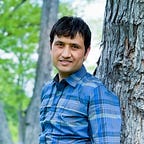The power of protesting
In Fall 2020, I was granted admission to the graduate program in the School of Journalism and Mass Communication at Kent State University. After receiving the acceptance letter, I wanted to learn more about the school, its history and culture. One of my initial findings about Kent State University was the May 4 shooting. It totally shocked me.
It is tragic event a that happened on May 4, 1970 on Kent State campus when the Ohio National Guard opened fire on students protesting the Vietnam war. The shooting left four students dead and nine others wounded.
As an immigrant from a war-torn and poor country, I have always had very high expectations and thoughts about the developed world especially about the United States. I had never thought about such a tragic event happening on a college campus in America. It is still hard for me to believe the fact that the students were killed at the hands of the Ohio National Guard, the very protectors of the citizens.
I don’t know why, but for some reason I try to relate most of what I learn and witness in the United State to my home country, Afghanistan. For the first few months of my life in the United States I even used to convert my bills to the Afghan currency to make a good sense of the prices. After four years in the United States, I am used to the currency, but I still look at the U.S. culture, politics, journalism and history through my Afghan lenses and I try to figure out what lessons Afghanistan can learn from the United States in terms of culture, politics, journalism and other walks of life.
Reading about the Kent State incident instantly reminded me of the sieges and attacks on the universities in Afghanistan.
In early November 2014, Abdul Qadim Patyal, the deputy governor of Kandahar and student at Kandahar University was gunned down in his classroom . The Taliban blatantly claimed responsibility for the shooting. Unlike May 4 incident at Kent State, this event did not spark any protests, not even from Patyal’s classmates and professors who watched life bleeding out of the body of the 32-year-old young man.
In August 2016, gunmen stormed the American University of Afghanistan in Kabul which resulted in 17 deaths and left over 50 others with injuries. Again, no one protested.
Most recently in November 2020, a group of militants entered Kabul University, killed 22 and wounded 22 others. This time again, the anger and condemnation from students and civil society activists on social media faded away within a few days.
The 40-year war has made Afghans so accustomed to killings that it no longer hurts us as it should. It no longer frustrates us as it should and we no longer show the due reaction to such tragedies. It has numbed our anger nerves.
It is risky for a nation to have a notion for war as a normalized phenomenon. Probably that is the reason the war in Afghanistan has been so chronic.
For me the lesson to take home from Kent State shooting is this: Kent State students stood, mourned, screamed and raised their voices against the killings of their fellow schoolmates. Their demonstrations sparked a wave of nationwide protests from students. It is believed that these protests played a vital role in ending the Vietnam war . It shows the power of standing up, the power of screaming, and the power of staying united in grief moments. Thus, a favorable change is an inevitable result.
The tragic event of May 4 is annually commemorated by the university. Even 51 years later the victims of May 4 are honored and remembered and they will be for the years to come.
The prolong war in Afghanistan has to be condemned and criticized through all non-violent means to an extent that no one else in the future would dare to kill us. We have failed on that front, and the result is that the terrorists’ groups such as IS are able to convince our young generation of joining them.
Originally published at https://noorulbari.blogspot.com on May 4, 2021.
